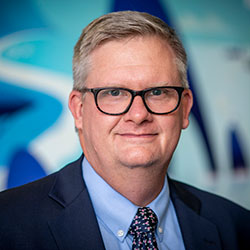Diagnosing and Treating Thyroid Cancer: A Q&A With Drs. Scott Manning and John Dahl, with Case Study
November 6, 2019
Is thyroid cancer on the rise?
Scott Manning, MD, program director, Otolarnygology Education, and John Dahl, MD, PhD, MBA, pediatric otolaryngologist, Seattle Children’s: Yes, the reported incidence of thyroid nodules across all age groups is increasing in the United States, with thyroid cancer now the fastest-growing cancer diagnosis for adult women. We believe environmental factors are contributing to this rise. For children, a thyroid nodule has an even higher chance of being malignant than for adults; in some centers, as many as 20% of pediatric thyroid nodules turn out to be cancer, versus 5 % in adults. That said, it’s important to keep in mind that the majority of thyroid nodules in children and adults turn out to be benign. About 350 pediatric thyroid cancers are reported each year in the United States.
What is the best way to diagnose a thyroid nodule?
 John Dahl, MD, PhD, MBA
John Dahl, MD, PhD, MBA
Ultrasound is the best way to initially evaluate a nodule and will determine whether a particular nodule additionally needs a fine needle aspiration (FNA) biopsy in order to make the definitive diagnosis. Ultrasound does not require anesthesia/sedation or radiation and is cost-effective. It can also be used to evaluate for the presence of cervical metastases in children with thyroid cancer.
At Seattle Children’s, we are able to do FNA biopsies in clinic with our kids awake under local anesthetic, which makes the process that much safer and easier on the family and child. About 85% of our FNA biopsies are done this way, which is unique in the United States; most FNA biopsies elsewhere are done under general anesthesia.
It’s important to have a patient’s ultrasound read by a pediatric radiologist rather than an adult radiologist, because of their specialized knowledge and training in working with children and imaging.
For a variety of treatment-related reasons, we don’t recommend diagnosing a nodule by starting with a CT with contrast.
What makes the Thyroid Program at Seattle Children’s unique?
Our program has an integrated team of providers from a number of specialties who provide coordinated care. These include specialists from Otolaryngology, Endocrinology, Hematology-Oncology, Radiology, Interventional Radiology, Pathology and General Surgery. We meet monthly to discuss cases and decide the best care options for each patient. Few programs in the United States provide this level of service and expertise.
While the national survival rate for children with the most common thyroid cancer, papillary thyroid cancer, is thankfully 99%, our program makes the road to survival better for patients and families because of the comprehensive services we offer all in one place. We fully coordinate the patient’s care and minimize the time and energy families otherwise would spend on things like having to find various specialists, make separate appointments, wait between visits and handle paperwork.
We are now probably the second-busiest pediatric thyroid program in the United States, after Philadelphia. This is in part because we serve a large geographic area (we see patients from Washington, Alaska, Idaho, Montana and Wyoming) and also because our team has the deepest experience in pediatric thyroid cancer in the five-state region. Our work in nodule biopsies and surgery cases has grown steadily; we perform, on average, 40 FNA biopsies and 15 to 32 thyroidectomies per year.
Is this program just for patients with thyroid cancer?
No, we evaluate patients with thyroid nodules and diagnose and treat other thyroid diseases, including Graves’ disease, toxic nodules, familial cancer syndromes and multinodular goiters.
What treatments does Seattle Children’s offer for pediatric thyroid cancer?
We have every service a child with thyroid cancer will need, including diagnostics (ultrasound, CT, MRI and FNA biopsy), surgery, management of the hypothyroid condition that results after surgery, radioactive iodine treatment (RAI 131) and follow-up throughout childhood with our hematology oncology providers and Cancer Survivor Program. Once our patients reach 21, we refer them to our colleagues at the University of Washington system. We also have cutting-edge genetic testing and targeted chemotherapy for appropriate patients.
What if my pediatric patient has a thyroid nodule?
A thyroid nodule of any size should be evaluated with an ultrasound. At Seattle Children’s, we will review the ultrasound results at no charge and decide if the patient needs further evaluation. We are open to new referrals; for a patient with a nodule, we ask that you fax their thyroid ultrasound results and serum TSH, T3 and free T4 to 206-985-3121 or 866-985-3121.
For families with a thyroid concern, we have an informational page about thyroid cancer on our website, as well as an explanatory video for patients who are scheduled for a fine needle biopsy.
Is it hard to get an appointment in the Thyroid Program?
No, patient access to our program is excellent, and wait times for appointments are minimal or none. We have three attending physicians available every day and a pathologist in clinic who reviews biopsy specimens to ensure they are good for diagnosis.
What else should I know about thyroid nodules?
The main thing to know is that kids get nodules, and mostly they are benign. But when diagnosis and/or treatment is needed, and even if the prognosis for treatment is excellent, the best outcome still involves having an expert, wraparound care team that supports the whole family during treatment.
For questions related to your patient’s thyroid, call our nursing line at 206-987-2105 option 4 or email us at PedOTOThyroid@seattlechildrens.org.